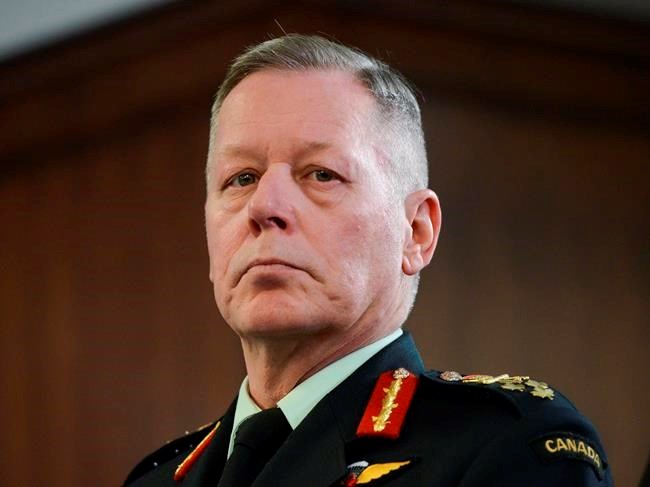OTTAWA — A landmark legal battle over the independence of judges responsible for overseeing military courts martial has gone meta with new questions over the autonomy of a judge hearing the case.
The Court Martial Appeal Court of Canada hearing revolves around then-defence chief Jonathan Vance's decision two years ago to task an officer under his own command with disciplining the country's four military judges.
Three of those four military judges later stayed several cases, saying Vance's order impinged upon their independence and thus robbed service members accused of wrongdoing of their right to fair trials.
The question of whether military judges are independent was subsequently sent to the Court Martial Appeal Court, where three civilian judges including Chief Justice Richard Bell heard arguments from both sides in the winter and was set to make a ruling.
But now lawyers for the accused in seven affected cases want permission to submit new evidence and argue Bell is not sufficiently independent. That evidence includes Bell’s own statements to a judicial commission this month about his lack of independence.
Bell specifically flagged the fact that all justices on the military Appeal Court are required to be sitting judges in other courts at the same time. In his case, Bell is a sitting Federal Court judge in New Brunswick.
“Membership as a judge or even chief justice of the CMACC is dependent upon membership as a judge of another source court," reads a submission prepared for the commission on Bell's behalf in March and referenced by defence lawyers in the seven cases.
"This potentially exposes the chief justice of the CMACC to the directives of other chief justices, thereby compromising his or her capacity to effectively carry out the independent functions of the CMACC."
The defence lawyers also included in their submissions several statements by fellow Court Martial Appeal Court judge Edward Scanlan, who appeared alongside Bell before the judicial commission on May 11, questioning the independence of the chief justice.
Those include an email from a Federal Court administrator to Bell, which Scanlan read aloud, suggesting the administrator's control over Bell’s schedule affected his ability to work on military appeals.
Scanlan described the situation as "the chief justice of a national court sitting and hearing cases where he is being told by a trial court how much time he is going to get because they fill the rest of his time up."
"That is a direct, frontal attack by a source court. It has allocated to itself the exclusive authority to decide how much time CMACC justice has to do his work. It's a frontal attack on his judicial independence and on the judicial independence of the court."
Bell’s lawyer Eugene Meehan, who prepared the submission on the chief justice's behalf, declined to comment on Wednesday.
Wendy Wharton, a spokeswoman for the Judge Advocate General’s office, which is responsible for ensuring the proper functioning of Canada’s military justice system, also declined to comment.
Wharton did say that military prosecutors will respond by Friday to the request to submit evidence, adding that five other cases in addition to the seven that are currently part of the appeal have been adjourned until the CMACC responds.
Among those initial seven cases is one court martial involving three counts of sexual assault against an officer in British Columbia.
Retired lieutenant-colonel Rory Fowler, who is now a lawyer specializing in military law in Kingston, Ont., blames the current legal battle on Vance’s refusal to cancel his order extending the military’s disciplinary code to the judiciary.
“There's a lot of things you can blame Jon Vance for these days, but did it help that the chief of the defence staff throughout 2020 stubbornly refused to rescind an order that the military judges clearly considered to be a breach of the Constitution?” Fowler said.
“That was a bad call on his part.”
As for what happens next, Fowler said it would largely depend on what military prosecutors try to argue on Friday.
The question about Bell’s independence represents the latest test to Canada’s military justice system, which was subjected to significant challenges and upheaval even before the current crisis involving allegations of misconduct by top commanders.
Those include several largely unsuccessful challenges over its constitutionality and the unprecedented prosecution of Canada's top military judge, colonel Mario Dutil, on fraud charges.
That case fell apart in March 2020 after Dutil's deputy, Lt.-Col. Louis-Vincent d’Auteuil, recused himself and refused to name another military judge to take over, saying two of them had conflicts of interest and the third wasn’t bilingual enough.
Dutil quietly retired nine days later and the government has yet to name a replacement.
The recent focus on sexual misconduct has also cast a light on the military justice system's ability to handle such cases, while retired Supreme Court justice Morris Fish is set to release a report before June 1 following a months-long review of the system.
"Our institutions and mechanisms are not living up to the needs of those who have experienced misconduct, and this includes the military justice system," Defence Minister Harjit Sajjan's spokesman Daniel Minden said in an email.
Retired Supreme Court justice Louise Arbour is conducting her own review on how to stop sexual misconduct in the military, which will also include a review of the court-martial system.
This report by The Canadian Press was first published May 27, 2021.
Lee Berthiaume, The Canadian Press



